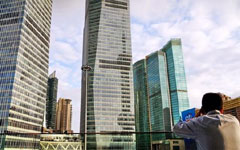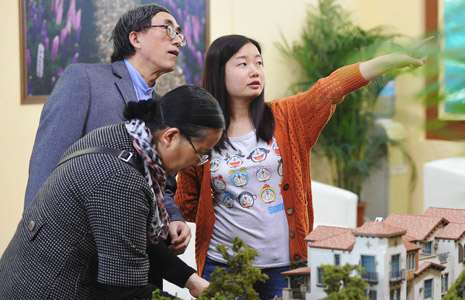Beijing's office rent set to stabilize in H2
Updated: 2014-08-06 14:31
By Hu Yuanyuan (chinadaily.com.cn)
|
|||||||||||
Average net effective rent of Beijing's Grade A office is expected to stabilize in the second half after five consecutive quarters' decline, a report from Colliers International showed on Wednesday.
"The positive economic growth in June and steady levels of pre-commitment for the upcoming supply are expected to restrain the growth of the vacancy rate, and lead the average net effective rent to stabilize after several quarters of decline," the global real estate consultancy company said in a research report.
|
 |
|
 |
However, the decline in rents slowed, and some submarkets experienced modest growth. In both the CBD area and the Lufthansa area, rent declined by 1.1 percent q-o-q, respectively. In the CBD, this was primarily an effect of below-market average rent at a new project launched in the fourth quarter of 2013. By contrast, the Financial Street, Zhongguancun and Wangjing submarkets all saw modest rental growth, to 384.5 yuan psm per month (up 1.7 percent q-o-q), 242.2 yuan psm per month (up 2.9 percent q-o-q) and 228.9 yuan psm per month (up 2.4 percent q-o-q), respectively.
Going forward, five office projects are scheduled for completion during the second half of 2014, bringing a total of about 250,000 square meters of office space to the market. As a result, the competition between (and within) existing buildings and new developments, and even between (and within) traditional submarkets and emerging areas, is expected to increase, resulting in an active leasing market, according to the report.
Related Stories
'Too many offices' in the works 2014-04-24 07:20
Office buildings sit idle in China's economic heartland 2014-04-18 14:33
Shanghai to lead top-end office market by 2020 2014-03-21 15:05
The 10 most expensive cities to rent office space 2014-02-21 08:26
Beijing office space 4th most expensive globally 2014-02-19 07:28
Beijing, Shanghai rated best in office investment 2014-01-13 20:17
Today's Top News
Nanjing takes fresh approach to Youth Olympics
China to punish Chrysler, Audi over monopoly
Beijing boosts checks on foreigners
Russia to retaliate against sanctions
Youth Olympics on lookout for Ebola
Flash making emperor 'alive' goes viral
US artist creates lifelike baby animals
Chinese ink paintings shine in France
Hot Topics
Lunar probe , China growth forecasts, Emission rules get tougher, China seen through 'colored lens', International board,
Editor's Picks

|

|

|

|

|

|





